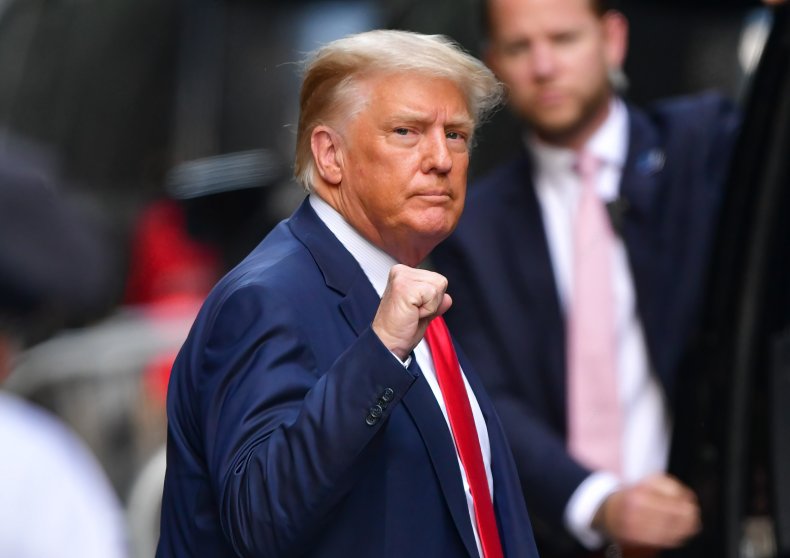Donald Trump's Delayed 2024 Decision Helps Maintain His GOP Grip
Former President Donald Trump stalling on announcing whether he will run for the White House again in 2024 could help him maintain a grip over the Republican Party, political experts have told Newsweek.
In an interview with conservative talk show host Joe Pags on Thursday, Trump suggested he could wait until after the 2022 elections before revealing whether he will run for the GOP nomination in 2024.
"Everybody wants me to do it, the polls are all saying I have to do it. I will be making a decision maybe before but possibly more likely right after the 2022 election," Trump said.
He has previously hinted at running and said he is considering doing so.
Thomas Gift, founding director of University College London's Center on U.S. Politics, told Newsweek that Trump delaying his decision extends his influence over the GOP.
"There's no doubt that Trump's choice to delay announcing whether he will run for president extends his influence over the Republican Party," Gift told Newsweek on Friday.
"The longer he holds out making a decision, the more the anticipation around his candidacy grows, the more ability he has to play kingmaker within the party for the 2022 midterms, and the more he can freeze out other potential GOP candidates in 2024.
"For Trump, there's little cost to waiting. If he's genuinely eyeing the White House in 2024, securing the Republican nomination seems, if not preordained, highly likely given his resilient support within the party. If he's not interested, then telling his supporters now can only prematurely diminish his stature and hasten his irrelevance."
Mark Shanahan, associate professor and head of the Department of Politics and International Relations at the University of Reading, said that Trump's move indicates he is focusing on his power within the party.
"Trump's non-answers and non-committal statements reflect a calculating mind that's focused on considering how long he can maintain influence with the GOP," Shanahan told Newsweek.
"The reality is that he is far removed from power and cut off from the day to day politics of the party that never interested him anyway. And what's more, he's seeing a Biden presidency that hasn't tanked, is enjoying success around COVID vaccinations, will benefit from an economic rebound before the midterms and has even had its first foreign policy success with the Israeli/Hamas ceasefire.
"Trump is keen to present the front that the GOP revolves around him. But out of the White House and cut off from Twitter, his influence grows ever more peripheral. He wants to be seen to be driving the Midterm House races and certainly can continue to appeal to his base for now.
"But 35 GOP House members have already broken ranks with him and voted for the commission to investigate the January 6 insurrection.
"The legal eagles and vultures are circling in New York. All he can do to retain a presence in the news and thus perceived influence in the party is to tease a possible run for 2024."
The Trump Organization is currently facing criminal investigation by the attorney general of New York and the district attorney in Manhattan. The former president has denied any wrongdoing and slammed the probes.
"A 'real' campaign could be holed below the waterline by the commission or by the Manhattan District Attorney before it even takes its first breath. If that happens, his influence either as a candidate or Kingmaker for the Republican Party ends immediately," Shanahan said.
"But by keeping both traditional media and the social media masses guessing, he retains some hold over the GOP, many of whom are fearful from breaking with his populist roller-coaster for fear of the impact on their own political careers."
Robert Singh, professor at the Department of Politics at Birkbeck, University of London, told Newsweek he thinks holding off is a well-calculated move for Trump.
"Delaying any announcement on a 2024 run is a sensible strategy for Trump.
"As long as he remains a potential contender, activists, donors and Republican operatives will not want to show their hands too early for an alternative candidate," Singh said, adding that the decision "helps to divide the field."
"If multiple candidates think he may or may not run, it becomes difficult for anyone to assume a 'front-runner' status.
"Ultimately, Trump can't lose via this approach.
"If he endorses and raises funds for successful GOP candidates, then the return of the House and/or Senate to Republican majorities would be a victory he'd claim credit for achieving.
"But if the Republicans fail to win one or both houses, he can blame the 'establishment' of Mitch McConnell and others in DC, and present himself as the needed savior of the party in 2024."
Newsweek has asked former President Trump for comment.


